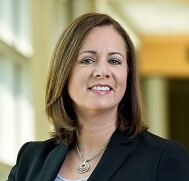May 11, 2021

Take That, Cheese! Julie Murchinson Interviews Dr. Janice Nevin, CEO ChristianaCare
Dynamic Women Leading Healthcare in Dynamic Times
Good leaders are active listeners, ensuring they engage fully, respond thoughtfully and recall later important details that demonstrate their deep and empathetic understanding. The events of the last year demanded active listening on steroids as leaders worked in real-time to solve unbelievable problems and often in the trenches collaborating with staff, customers, partners and many atypical stakeholders under impossible timelines.
For Dr. Janice Nevin, CEO of ChristianaCare, active listening wasn’t enough. Janice immersed herself in ways that transformed active listening into a much more intense and empathetic skill: immersive listening. And immersive listening has resulted in a more deeply engaged community, a business model of more purpose-built partnerships and a high-functioning team ready to take on the most unimaginable challenges.It can be difficult to listen to someone when you’re armored. Yet for frontline healthcare professionals, that’s been central to COVID-19’s immutable frustrations. Enveloped by PPE, they’ve been charged with somehow shedding those barriers in order to connect with the human needs of the vulnerable patients in their care. The risk of infection raised divisions, both material and emotional, that have characterized the fractured reality of the past year.
 For Dr. Janice Nevin, leading a health system through the pandemic has demanded transcendence of the shields imposed by the virus to immerse herself in the needs of the organization, its staff, patients and wider community. To do so, she’s had to draw from a well of less-tapped personal resources, chief among them, employing a new way of leading by immersively listening.
For Dr. Janice Nevin, leading a health system through the pandemic has demanded transcendence of the shields imposed by the virus to immerse herself in the needs of the organization, its staff, patients and wider community. To do so, she’s had to draw from a well of less-tapped personal resources, chief among them, employing a new way of leading by immersively listening.
“Managing a complex health system always demands the ability to shift focus and solve problems. When the COVID-19 pandemic arrived, there wasn’t a playbook. We had to rely on our culture — our values and our mission — and I knew I needed to take a new approach to leadership in that moment. Nothing in my experience — and everything in my experience — prepared me for what COVID threw at us.”

“It became clear to me early on that infectious disease protocols were — literally — constructing and equipping barriers around each individual and patient. For safety, these barriers enforced a climate of isolation, when what I’d need to solve our challenges was exactly the opposite.”
“I had to have access to people so I could understand their needs, hear their ideas and help my team craft a shared path forward…”
“The adrenaline rush of crises can inspire ideas so novel you wonder where they came from; I’m sure we’ve all experienced that. But this pandemic was different. People were afraid.”
Once Janice understood that “we all were feeling something elemental and working from a place of similar emotions,” she felt she had something that she personally could use.
“I could lead by listening, but differently than I had before, more immersively, putting myself physically, emotionally and intellectually in the other person’s situation. Though COVID-19 forced us to separate, I had to do everything I could to immerse myself in this difficult, closed-off space. There was no other way.”
Janice took COVID-19 head on. She rounded every day and dropped into groups working virtually to listen. In the environment of heightened anxiety, listening was her subtle and non-threatening method for inviting and absorbing the strength of others’ ideas and expressed need.
Immersing directly in the communities ChristianaCare serves, building trust, and developing relationships across local organizations became more personal for Janice. It presented challenges of empathy, reflection and vulnerability, challenging her own preconceptions.
Janice saw the intense need to be more intentional about caregivers, investing in their health and well-being so they could meet the intense community needs and the imperative of transparency about everything, from COVID numbers to PPE. Janice and her team provided hotel rooms so frontline workers could isolate if needed, and special OASIS rooms with soft lighting and massage chairs to rest and de-stress. They provided childcare at no cost to 300+ caregivers as well as advanced paid leave. They worked round the clock to ensure that caregivers had the PPE they needed, despite shortages across the country. Combatting COVID required establishing trust, even if the outcome was far from certain.
The initial lack of leadership at the national level was felt by everyone trying to do right by their local community. “I feel like I am writing a script for a movie I am producing in a theater I can’t get out of,” said one of ChristianaCare’s nurses to Janice.
Bringing the Outside to the Inside
Like many non-profit healthcare systems, ChristianaCare serves a diverse population of patients whose non-native-English-language skills, economic level, transportation access and other social determinants of health routinely put them at greater health risk. COVID-19 only increased that threat, with more vulnerable populations impacted in higher numbers.
“Hospitals can have an outsized impact in the community. They are often the largest employer, the economic anchor and a trusted community partner. We were acutely aware of the existing health equity issues. We knew we would need to give people in vulnerable communities a place to turn.”

Immediately recognizing the disparities COVD was exacerbating, ChristianaCare opened COVID-19 care centers, akin to a retail hub, in some of Wilmington’s most underserved neighborhoods in collaboration with local community centers. The intent was to break down the COVID-stigma that was inhibiting people in the Latin American and other vulnerable populations from pursuing care and information. Staffed with community health workers, social workers, nurses and medical assistants, including capabilities for in-person and virtual visits, the community could see providers or seek COVID guidance.
As a living organism, these community-based care centers evolved into a point of engagement beyond COVID intervention and into immersive listening. Community members found a safe space to address community gun violence and access behavioral health support, each soaring due to the stresses of both the pandemic and widespread response to racial inequities and racial tensions that had erupted at the national level.
While ChristianaCare had long investigated approaches to work more closely with community organizations and local employers, the urgency of the pandemic helped bring that to fruition. Community successes accelerated investments and partnerships with community organizations, as well as ChristianaCare’s partnership with Unite Us to establish the social care network Unite Delaware. Working closely with employers, ChristianaCare established a COVID virtual monitoring program service and other direct-to-employer healthcare services. Together, they developed sustainable business models driven by community needs to benefit community health well beyond the pandemic.
Recharging Her Focus

Excerpts from Janice Nevin’s COVID-19 playlist. Share your favorite pandemic power-up songs with us at info@4sighthealth.com.
Janice’s days were marathons of triumphs and setbacks that have only partly receded as infection levels have declined and mass vaccination has begun. The awareness of greater community need and the methods of leadership have consumed Janice’s more recent thinking.
Janice continues to purposefully consider how she can translate the knowledge gained in this harrowing time. She wants to apply what she’s learned to building blocks to reform, diversify and expand healthcare over the next decade.
Change begets change. Leaders like Janice, who submerged their egos and fears to immerse themselves in the needs of the communities they serve, will guide the future of healthcare. They and their organizations will evolve in ways they may have only imagined.
Several personal coping mechanisms have been instrumental in Janice keeping her focus, listening chief among them, coincidentally. “Playlists have been a bit of ‘my thing’ as I’ve advanced in my career. While unrelated to the pressures of work, they let my mind go elsewhere in a way that centers me and puts me in the right frame of mind for the challenges ahead.”
“I created a COVID playlist that I knew would be my rock, helping me let go when I needed to. These five songs have become more than just a collection, they have become the experience-based tool to get me through, even today.”
Personally, Janice says, “perhaps, my favorite discovery of 2020 is the power of Peloton, which became my go-to for physical activity after the yoga studios shut down. I knew there was community there, but I didn’t know how much strength I would draw from it. Having someone tell me every morning that I am awesome. And knowing that I can be a hot mess and fabulous at the same time, that’s been a lifesaver.”
Janice E. Nevin, M.D., MPH, President and Chief Executive Officer, is a visionary and collaborative health care leader, Janice E. Nevin, M.D., MPH, has served as president and CEO of ChristianaCare since 2015. As leader of one of the country’s most dynamic health care organizations, centered on improving health outcomes, making high-quality care more accessible and lowering health care costs, Dr. Nevin is pioneering value-based care, leading a transformation from a health care system to a system that truly impacts health. She is nationally recognized for innovation in population health and her transformative vision for a health care system built on the values of love and excellence.
Under Dr. Nevin’s leadership, ChristianaCare developed CareVio, a unique data-driven virtual care platform to proactively address patients’ social and behavioral health needs in addition to their medical needs. CareVio supports patients across the continuum of care and is demonstrating better health outcomes while reducing the cost of care. It earned the 2017 John M. Eisenberg Patient Safety and Quality Award, the nation’s preeminent recognition for quality and safety in health care, and a 2017 Stand Up for Patient Safety Management Award from the National Patient Safety Foundation.





